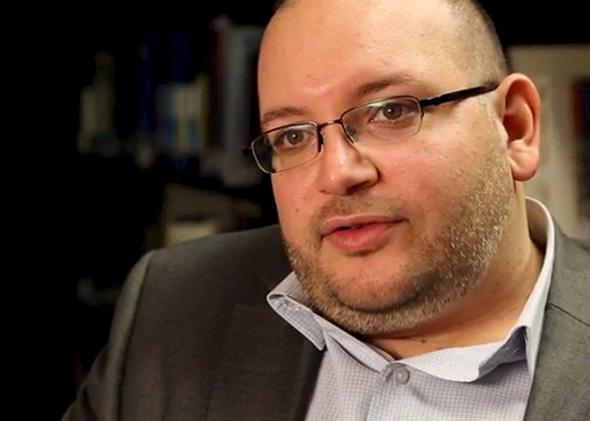Washington Post reporter Jason Rezaian went on trial today in Iran, nearly 10 months after his arrest. Rezaian, his wife, freelance journalist Yeganeh Salehi, and a female photojournalist whose name has not been released are being tried before one of Iran’s special “Revolutionary Courts,” usually reserved for sensitive national security cases, and the trial will be held behind closed doors. According to the BBC, the judge has been nicknamed the “judge of death” for the harsh sentences, including death penalties, he has handed down to activists and journalists.
The decision to hold the trial in private, denounced as “shameful” by Post editor Martin Baron today, is in keeping with the Kafkaesque nightmare these journalists have lived in since they were arrested without charges last July. The unnamed photojournalist and Salehi, who is an Iranian citizen, were released on bail last year. But Rezaian, a joint U.S.-Iranian citizen and the Post’s Tehran bureau chief, has been held in the notorious Evin prison and, according to the Post, denied needed medical care. His brother says he has lost 40 pounds since being arrested. He was held in jail for nine months before he was allowed to meet with an attorney and he had only one 90-minute meeting with her before trial. It was only after this meeting, in April, that the charges against Rezaian and his co-defendants were made public: They include espionage, “collaborating with hostile governments,” and “propaganda against the establishment.” The charges could carry a sentence of 10 to 20 years in prison.
From what’s been made public, it certainly seems as if Rezaian is being charged with committing journalism: Collecting sensitive information and meeting with anti-government sources is part of the job description. According to his attorney, a letter written to President Obama is being cited as an example of his contact with a “hostile government”—i.e., the government of the country where he was born and raised. The defense plans to claim that the U.S. and Iran are not, in fact, “hostile” nations, despite ongoing tensions, which gets to the real reason Rezaian is being imprisoned.
Rezaian’s trial is most likely a ploy by political hardliners in Iran to undermine President Hassan Rouhani and his efforts to improve relations with Western governments, particularly the nuclear deal currently under negotiation. Some of these hardliners have dropped hints that Rouhani’s nephew, who works in the Iranian president’s public relations office, gave Rezaian access to sensitive information, though Rezaian’s family denies he was in contact with any of Rouhani’s relatives. As Middle East expert Haleh Esfandiari pointed out last summer, there’s a history of foreign spy plots suddenly being uncovered at times when relations between Iran and the West seem on the verge of improving.
In trying to scuttle the nuclear deal, Tehran’s hardliners are in a tacit alliance with their counterparts in Washington. A number of GOP senators have called for the release of Americans being held in Iran to be a condition of any final deal. (In addition to Rezaian, a number of other Americans are being held, including Saeed Abedini, a Christian pastor from Idaho, Amir Hekmati, a U.S. Marine veteran charged with espionage, and Robert Levinson, a former FBI agent who went missing on Iran’s Kish Island in 2007.) The White House has repeatedly spoken out about Rezaian’s case and demanded his release but has resisted linking the two issues.
While there are legitimate reasons for concern over whether an opening on the nuclear issue will—at least in the short term—lead to more human rights crackdowns in Iran, including an ultimatum as part of the nuclear deal is more likely to scuttle the deal than to actually win Rezaian’s release. For those against the deal in both nations, that may very well be the whole point.
